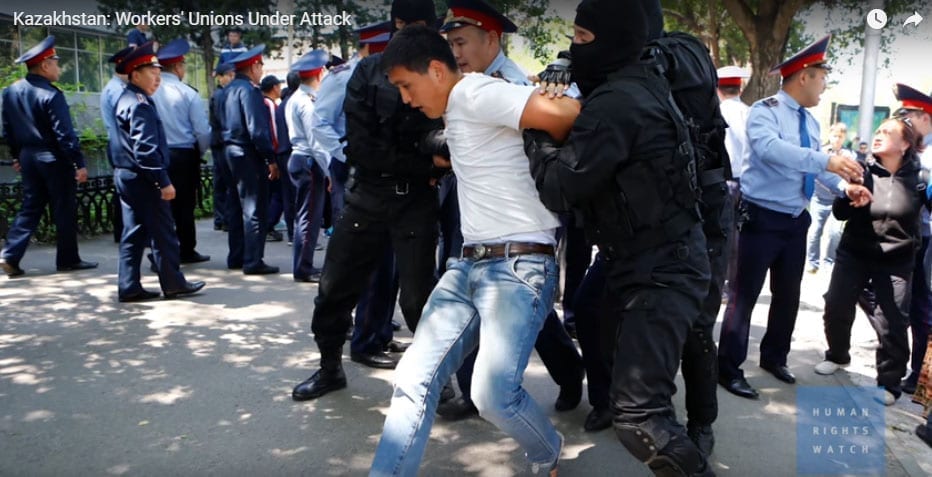
Dec 16, 2016
Union leaders tell the Solidarity Center that the Kazakhstan government has launched a campaign to intimidate union members and to malign and discredit the Confederation of Independent Trade Unions (CFTUK). In addition, the regime has initiated legal action to liquidate the confederation, while leaving intact a government-aligned federation.
Yet even in the face of threats and danger, union leaders and workers say they vow to hold protests if the CFTUK is dissolved.

The Kazakhstan government is seeking to dissolve unions of health care workers and others. Credit: Kazinform
The Kazakhstan Ministry of Justice brought a legal challenge before the country’s Economic Court calling for revocation of CNTUK’s registration and its affiliated unions representing health and domestic workers—essentially making union activity illegal.
In a letter, the International Trade Union Confederation (ITUC) denounced the government’s failure to guarantee the right to freedom of association and called on it to withdraw the request before the Economic Court.
A new report also shows Kazakhstan’s new trade union law, adopted after strikes in 2011, has made it more difficult to organize independent unions in the country. “Changes to the labor and criminal codes have contributed to an environment hostile to worker activism,” according to Human Rights Watch, which released the report.
“‘We Are Not The Enemy’: Violations of Workers’ Rights in Kazakhstan” is based on interviews with more than 50 trade union leaders, labor activists and workers across Kazakhstan, and describes harassment, surveillance and, in some cases, spurious legal prosecution or dismissals in apparent retaliation for labor activism.
The International Labor Organization has examined the government’s failure to guarantee the right to freedom of association and in 2015 and again this year urged it to amend laws regarding union registration. The government has not acted on these recommendations.
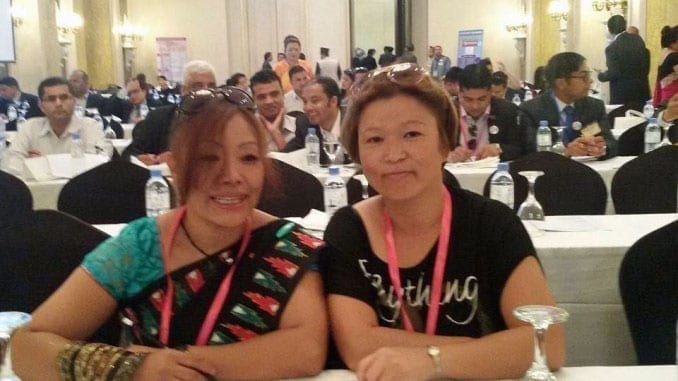
Dec 15, 2016
Some two dozen human rights organizations are condemning the detention of two Nepali domestic workers in Lebanon, one of whom was deported.
Sushila Rana and Roja Maya Limbu were detained “without formal and clear explanation of the charges levelled against them,” according to the International Domestic Workers Federation (IDWF). Rana was deported December 10 (International Human Rights Day), while Limbu has been detained for more than a week without access to a lawyer.
(Your organization can sign the joint statement by IDWF, the International Trade Union Confederation (ITUC), Human Rights Watch and other human rights organizations.)
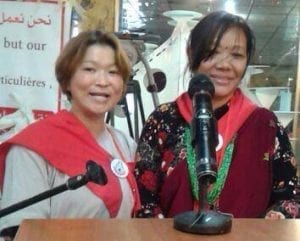
Sushila Rana and Roja Maya Limbu spoke at the founding congress of the domestic workers’ union in Lebanon in January 2015. Credit: IDWF
The two woman helped found the domestic workers’ union in Lebanon in January 2015.
“This is a serious violation of basic human rights and (the International Labor Organization’s) core conventions on the right to organize and on freedom of association,” says Myrtle Witbooi, IDWF president. “We also call on the government of Lebanon to observe and abide by Article 9 of the International Covenant on Civil and Political Rights (ICCPR), which ensures the right to be free from arbitrary arrest and detention.”
Migrant Workers Exploited, Have Few Rights
Migrant workers to the Middle East are rarely protected by labor laws and generally denied the ability to exercise fundamental human rights, including freedom of association, which makes them vulnerable to exploitation and abuse, according to a recent report by the United Nations Special Rapporteur on freedom of assembly and of association. Migrant domestic workers in Lebanon commonly report non-payment of wages, forced confinement, employers’ refusal to provide time off, and verbal and physical abuse.
Like most migrant workers around the world, many are forced to go into debt to pay excessive fees to labor brokers to obtain the jobs. Once in the country, they are governed by the repressive kafala system, which ties a domestic workers’ visa and work permit to one employer. Kafala results in situations where employers have unchecked control over migrant workers, exposing the latter to greater risk of exploitation and abuse.
Freedom of movement for the estimated 250,000 migrant domestic workers in Lebanon is restricted by employers who take workers’ passports and laws that limit their access to public places like restaurants, unless accompanied by their employer.
A 2010 Human Rights Watch report said that migrant domestic workers in Lebanon were dying of unnatural causes at a rate of one per week. Most of the deaths were attributed to suicide — many of the victims were falling from buildings while apparently trying to escape their employers.
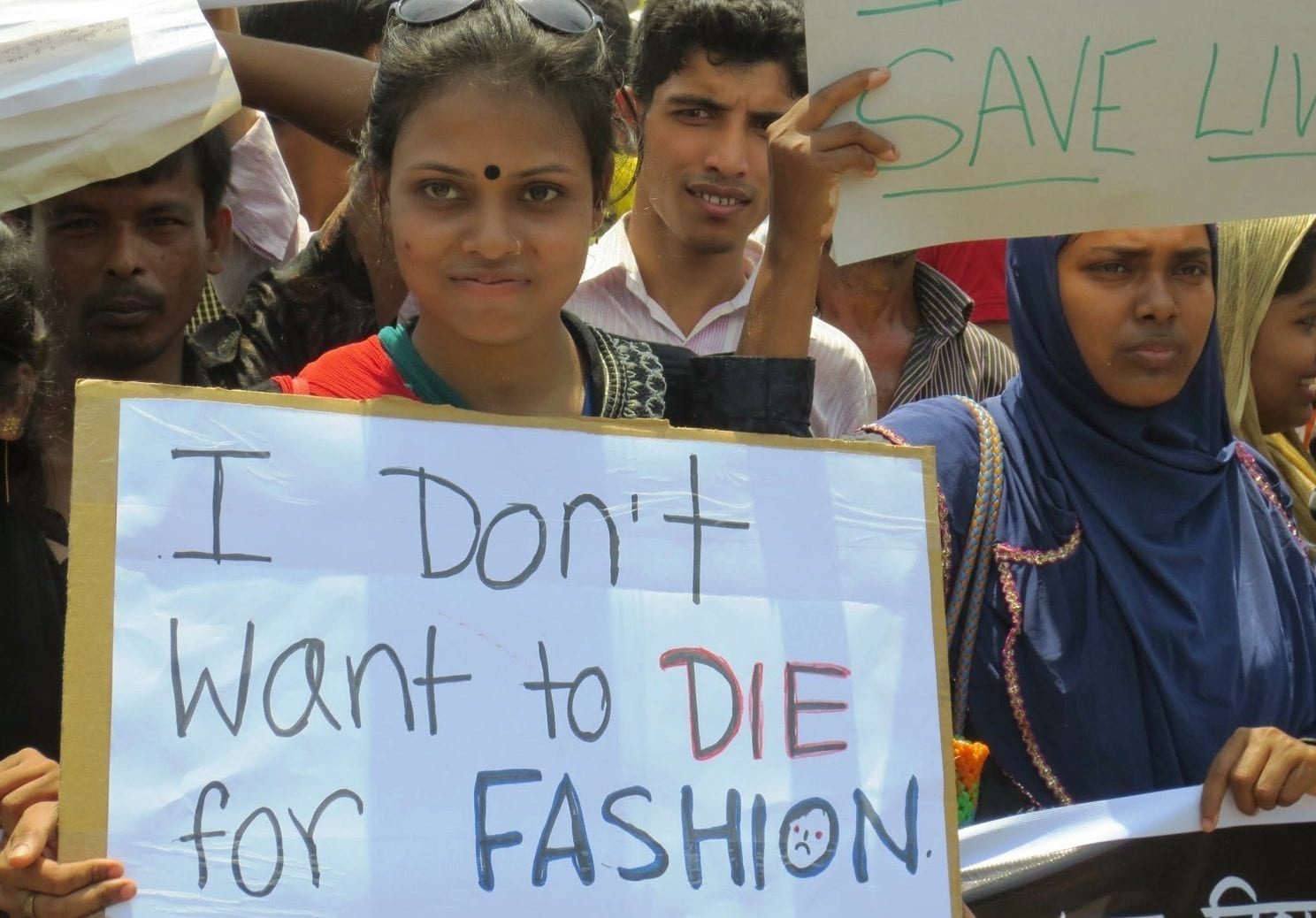
Nov 23, 2016
On the eve of the tragic Tazreen Factory Ltd. fire that in 2012 killed 112 garment workers in Bangladesh, Solidarity Center Executive Director Shawna Bader-Blau discussed on the Working Life podcast published today how global inequities led to Tazreen and to the 2013 Rana Plaza building collapse in Bangladesh—and how unions can enable workers to help prevent such disasters.
Describing her visit to the burned-out Tazreen factory, Bader-Blau says workers who survived the collapse met with her.
“They told me that they had tried to form unions in that building … and their union organizing efforts were busted by the supervisors and the employers,” she says. “They told me that had they had trade unions, they really believe they would have had more power vis à vis the supervisors and the company to negotiate things like safety improvements for themselves and adequate wages for themselves and their families.
“When workers do have the ability to form and join trade unions, they can bargain to improve their wages, they can bargain with their employers to make their conditions better. Work should be about dignity.”
Listen to the full podcast here.
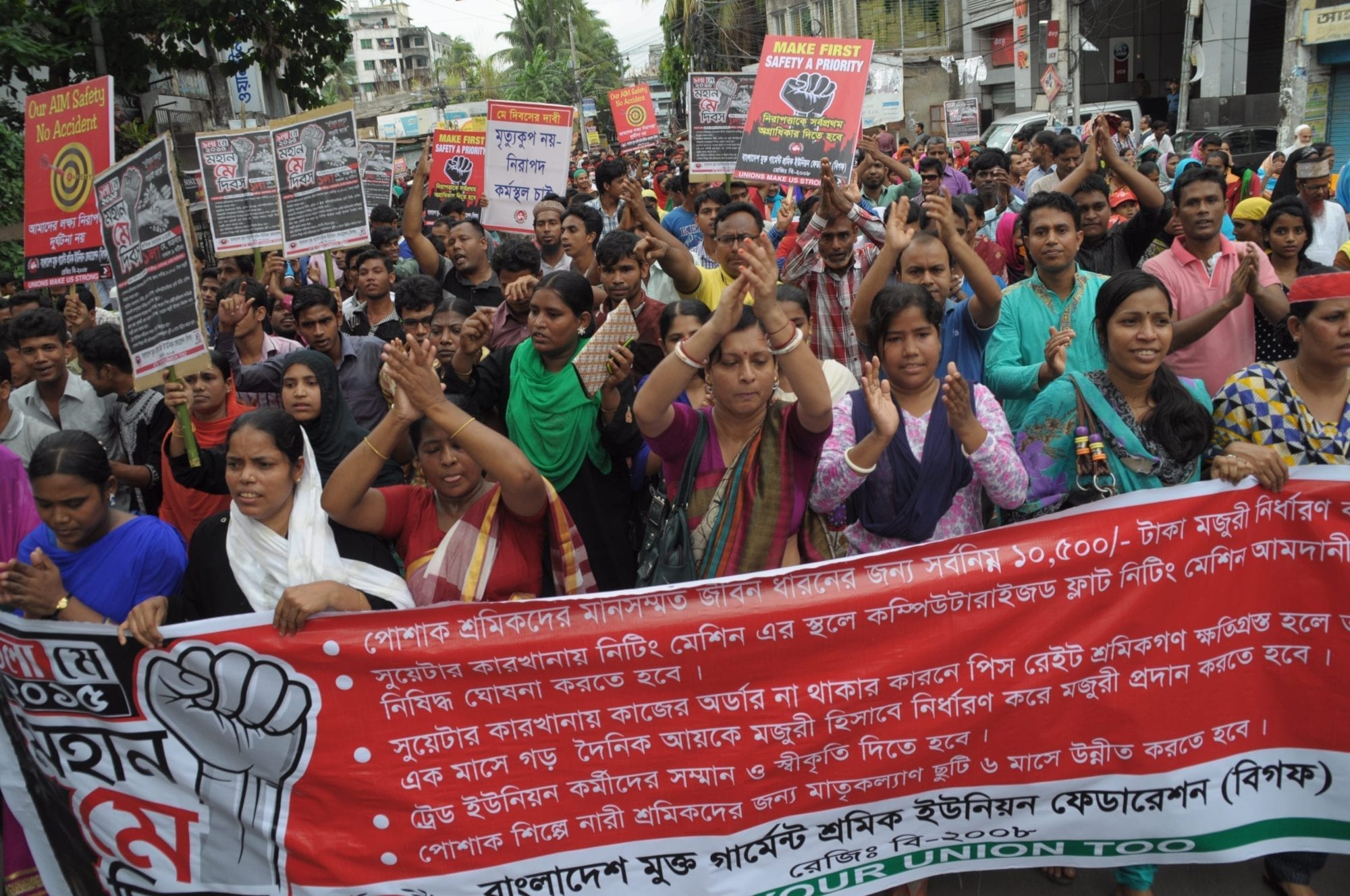
Nov 22, 2016
On November 24, 2012, a massive fire tore through the Tazreen Fashions Ltd. factory in Dhaka, Bangladesh, killing more than 110 garment workers and gravely injuring thousands more.
To mark the fourth anniversary of Tazreen, a new Solidarity Center photo essay depicts the system of exploitation in the global garment industry that made the fire at Tazreen so devastating, and showcases how workers have been standing together since the disaster to fight for safer working conditions and greater respect for their rights at work.
Dying for a Job: Commemorating the Anniversary of the 2012 Tazreen Factory Fire, illustrates how with the Solidarity Center, which partners with unions and other organizations to educate workers about their rights on the job, garment workers are empowered with the tools they need to improve their workplaces together.
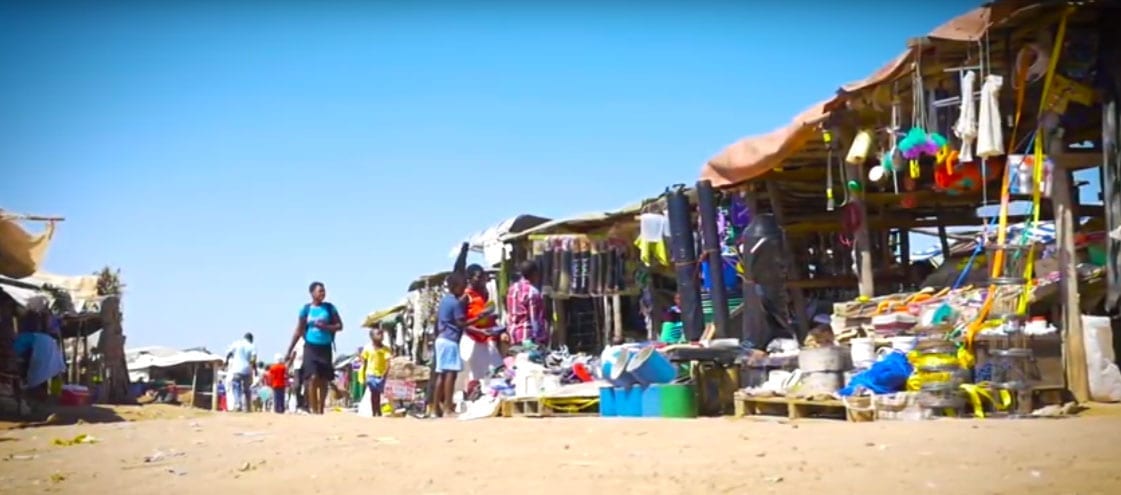
Nov 15, 2016
In Binga, a small community 400 miles west of Harare, Zimbabwe’s capital, residents support themselves and their families fishing the vast Lake Kariba. With no industry in the area, they depend on the lake for their livelihoods. Yet they say they face constant challenges in making a living—the biggest of which is harassment from officials.

“We are oppressed by the … authorities. Our fish are confiscated”—Alice Mudenda, a fisher in Binga Credit: ZCIEA
“We are oppressed by the … authorities,” says Alice Mudenda, a fisher in Binga. “Our fish are confiscated by either the police, rural district council or National Parks officials under unclear circumstances.”
Binga fishers must have a license to fish—yet it only can be obtained in Harare, an eight-hour journey, and the cost, up to $2,000 every three months, is well beyond their means.
Some 94 percent of Zimbabwe workers make their living outside the formal economy, and yet like Mudenda, they say they are harassed and bullied by authorities, according to a survey by the Zimbabwe Chamber of Informal Economy Associations (ZCIEA), a Solidarity Center ally.
81% of Zimbabwe Informal Economy Workers Bullied or Threatened
Eighty-one percent of the 514 respondents say they have been bullied, with 22 percent specifying that the harassment involved both confiscation of goods and threats of violence.
Some 36 percent noted the source of harassment stemmed both from the local authorities and the Zimbabwe Republic Police, the national police force of Zimbabwe, with 32 percent citing local authorities as the biggest source of harassment.
The ZCIEA survey also found widespread fear and distrust of law enforcement officers, with 82 percent of respondents saying they had not reported their harassment to police because police are the harassers (46 percent) or they fear police (17 percent).
Market Vendor Law Targets Livelihoods
In June, the Zimbabwe government introduced a statutory law that bans imports of basic commodities—a law that directly affects hundreds of thousands of informal economy workers who survive on cross-border trading. Merchants in towns like Beitbridge, which borders South Africa, reported plummeting sales after the law’s passage.
Tens of thousands of market vendors protested the new law, joined by civil servants outraged over the government’s refusal to pay their salaries, holding a successful one-day shut-down of businesses, government and services July 6.
The survey covered 25 areas across the country, with 53 percent of respondents women and 40 percent men (7 percent did not answer). The majority are between ages 35 and 44 (35 percent), followed by 25–34 years (27 percent) and 45–54 years (16 percent).
ZCIEA was formed in 2004, when the Zimbabwe Congress of Trade Unions (ZCTU)/Commonwealth Trade Union Council (CTUC) project began working with 22 trader associations to launch an umbrella organization to better coordinate efforts.
ZCIEA, with 198,466 registered members, offers training and legal support, along with legislative advocacy. In the report, the association points to the need to address the widespread harassment of informal economy workers by developing programs that further empower members, including workshops on legal rights and representation and preventing sexual harassment.








